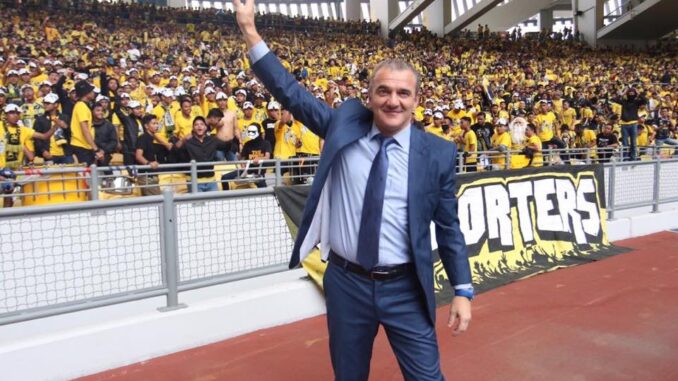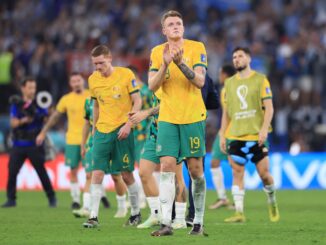
If you believe the rumour mill, Melbourne Victory has their heart set on Arthur Papas, Ange Postecoglou’s current right-hand man at reigning J.League champions Yokohama F.Marinos, as their new manager, while Adelaide United look set to hand the reigns to club legend Carl Veart, the scorer of the first ever goal in the A-League back in 2005.
If that comes to fruition, there would be precious few complaining, both are young local coaches deserving of their opportunity. It’s what the A-League should be all about.
As is often the case whenever a vacancy comes up in the A-League, the usual names get put forward as potential options – John Aloisi, Damian Mori, Arthur Papas, even Harry Kewell gets a mention.
And that’s not to say they don’t deserve to be in the frame, they obviously do, but when names of potential coaches are thrown about one name is always conspicuously absent – Mehmet Durakovic.
Already I can hear the mocking laughter and the claims of “failure” after his short stint with Melbourne Victory almost a decade ago. It’s unfortunate that one of our most respected Socceroos defenders has become an internet meme.
Tough gig coaching, one baptism of fire and, according to some, your papers are marked never to be given another chance again. It takes a brave club to risk the wrath of their fans and give someone a second chance.
Remember, Ange Postecoglou was once on the scrap heap too after his “failure” with the Young Socceroos. Where would Australian football be now if it wasn’t for Brisbane Roar giving him a chance, and importantly when things got rocky, backing their man to the hilt?
So what of Durakovic? Out of sight, out of mind perhaps?
Since that failed stint with Melbourne Victory, he did what not enough aspiring coaches in this country do when looking for work – he looked to Asia.
The former Socceroos defender enjoyed a successful three years with Selangor in Malaysia as a player in the mid-to-late 1990s, and it was to Selangor, where he is still revered to this day, that he returned as coach in 2013.
And he had an immediate impact, finishing runner-up in the league to the all-powerful JDT in both 2014 and 2015, as well as winning the Malaysia Cup in 2015, one of the oldest and most prestigious tournaments in the region.
After leaving Selangor at the end of 2015, he took over Perak in 2017, once a formidable powerhouse in Malaysia at the early part of the century, but a club that had been starved of success in recent years.
Under Durakovic, however, success returned.
After finishing sixth in 2016, Bos Gaurus improved to fifth in 2017 and second in 2018, the same year they also won the Malaysia Cup – Durakovic’s fifth as player and coach.
While they slipped back to fifth in the league last season, they did make it to the final of the Malaysian FA Cup (not to be confused with the Malaysia Cup), losing to Kedah in extra time in the final.
His standing in Malaysia couldn’t be higher, and speak to any player that has played under him and they all will speak highly of the man and the coach.
So why is he seemingly out of the frame when it comes to the A-League?
The 64-times capped Socceroo is a no-fuss kind of guy. He was like that as a player too. He isn’t one to pump his own tyres or seek glory on social media. He’s happy just working away in the background, happy to go under the radar and do his own thing.
With opportunities to coach at a professional level in Australia so rare, the only option that aspiring coaches have is to look abroad, although precious few actually do that. Durakovic did, and not only that he’s had success doing it.
Southeast Asia is a tough place for a rookie coach, which is what Durakovic was when he arrived in 2013, with only half a season of senior coaching under his belt.
The conditions, the interference from overzealous chairmen, the lack of professionalism from the players when it comes to training and diet – it can be tough even for experienced coaches. And yet Durakovic has taken to it like a duck to water, earning the respect of everyone along the way.
We spoke to Durakovic on The Asian Game podcast last year ahead of the Malaysian FA Cup Final, played in front of a raucous capacity crowd of 83,500 at the Bukit Jalil Stadium in Kuala Lumpur, and he wouldn’t be drawn on whether he got the credit in Australia he deserves, it’s not his style to talk himself up, but he did elaborate on the challenges of coaching in Southeast Asia.
“I don’t know to be quite honest, I can’t speak about myself. Whether I do get the appreciation back home, what can I do? That’s someone else’s story to tell,” he said.
“It’s not easy being an Australian coach (in Southeast Asia). It helps be to a foreigner to get success, because if you don’t get success after two, three or four months these guys just say, ‘thank you very much’ and they’ll get someone else.
“It’s not easy being a foreign coach in a foreign country. If you don’t know the language, don’t know the religion, don’t know the culture you won’t survive here.”
His should be the blueprint that other aspiring coaches in Australia follow, and his should be a name at the top of the list when the next coaching position becomes available.
He has more than earned his shot at redemption.
Photo: Perak TBG
Listen to Mehmet Durakovic talk about his time in Malaysia on Episode 36 of The Asian Game podcast




